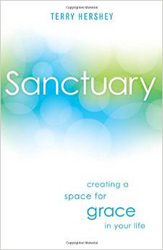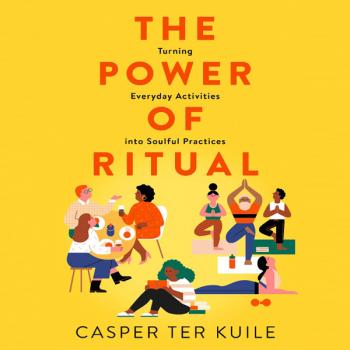“Sanctuary is not a ‘program’ or a ‘project.’ Our western mindset can see sanctuary as something on a list to check off, and if we’re diligent, something we can excel at. But sanctuary is not someplace we arrive. It is a journey, a direction we are going. An invitation to present, attentive and grounded—regardless of what comes our way.” — Terry Hershey, author, Sanctuary
Overwhelmed, overcommitted, and overscheduled? These are common answers we hear – and we speak – daily from/to our friends, colleagues, and family. We’re all way too busy, and long for just a smudge of space – uninterrupted, quiet space – in our days to stop, and be. We all long for a “sanctuary” for our soul.
Terry Hershey, an ordained minister, spiritual director, and landscape designer, has heard his own longings – even as he hears ours — and responded with a clear and inspiring book on finding sanctuary – in our homes, gardens and lives. Sanctuary: Creating a Space for Grace in your Life explores why we need sanctuary, why we resist it, and most importantly, how we find and cultivate it, as he leads us down a pathway to finding our own soul’s shelter.
 Here, Hershey offers a few thoughts on sanctuary for the Patheos Book Club.
Here, Hershey offers a few thoughts on sanctuary for the Patheos Book Club.
Who did you write Sanctuary for?
Ordinary people, who know that life can be heavy, busy, frazzled and overwhelming. Ordinary people, who know that life can be so… so… so… daily. Ordinary people, who are looking for replenishment, renewal and nourishment.
What does “sanctuary” mean to you?
It is a place where I can be grounded and unhurried. A place to be at home in my own skin—creative, prayerful, childlike, unruffled, attentive, hassle-free, playful, detoxified, reclaimed. A safe place for freedom, expression, reflection and care.
You say in your first chapter, that this journey of creating sanctuary space requires a shift in the way we think about “sanctuary.” What do you mean by that?
Sanctuary is not a “program” or a “project.” Our western mindset can see sanctuary as something on a list to check off, and if we’re diligent, something we can excel at. But sanctuary is not someplace we arrive. It is a journey, a direction we are going. An invitation to present, attentive and grounded—regardless of what comes our way.
Why is sanctuary an important part of our spiritual lives?
Because in sanctuary we are grounded. Which means that we are attentive to this moment. Which means that we let life in (all of it, not just the comfortable parts) and celebrate the sacrament of the present moment.
Is this a practice that you teach to people of different faith traditions? And if so, how does it change from faith to faith (or people of no faith)?
Yes. And to people who are uncertain about their faith. Because every one of us is wired to need grounding and renewal. I believe it’s in our emotional DNA. Different faith traditions offer specific portals and containers, and in those traditions we find stories of people who have gone before us. In those stories there is hope and confidence.
How do we begin to create ‘sanctuary’ in our lives? What does an ideal sanctuary look like?
We need to be careful with the word “ideal,” because there is no such thing as a perfect sanctuary. Sanctuary cannot be a race or a contest. Because in our sanctuary we find grace and self-nurture and healing and refuge. And this much we do know: Each sanctuary has these ingredients: a portal (an entrance or time to shift gears and refocus), a container (a safe place for expression, reflection, creativity and prayer), a slowing down and engagement of all the senses (when I’m grounded I pay attention) and is purposeful and routine (I make it a regular part of my life).
What are some of the most common challenges people have when trying to create sanctuary in their lives?
Well, life often hijacks our best-laid plans with interruption and distraction. And the messages we carry, “I’m not sure that I deserve to enjoy my sanctuary. It feels so selfish.” Or, “I’ll enjoy my sanctuary after I get all my work and projects finished.” Or, “Being exhausted and busy and indispensable is more important than self-nurture.”
Is “sanctuary” just for times when we’re at the end of our rope? When is a good time for “sanctuary?” Are there “seasons” of sanctuary?
No. It doesn’t hurt. But I’d prefer to think of sanctuary as preventative heart and soul care. As regular safeguarding. When I am home, I go to my sanctuary every day, in the morning, for 20 minutes. The time and place will vary from person to person. It’s important only that we recognize it and honor it. There are “seasons” only in the sense that there are times in our life when we need specific healing or renewal.
You also devote a chapter to creating sanctuary – sacred space – for others as well as ourselves. Would you say more about that? How can we be sanctuary-creators for our neighbors, our friends, the stranger?
Most definitely. In the book I tell the story about my Grandmother and her garden swing. And how it became for me—a young adult—a sanctuary. We all need sanctuary and we need to remember that no one of us is on a faith journey alone. We are in this together. And we can—and need to be—advocates for one another. Inviting others to places of sanctuary. Being a safe place—hospitality, listening and support—for others. There have been times in our lives when someone has been (or provided) sanctuary for us. And there are times when we are invited to pay it forward.
Read an excerpt — and more — from Sanctuary at the Book Club here!













